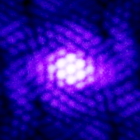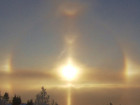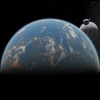|
Black Hole + Planet
|
|
| EnforcerDave | Date: Monday, 03.11.2014, 04:25 | Message # 1 |
 Observer
Group: Newbies
 Canada
Canada
Messages: 5
Status: Offline
| One thing that has been bugging me lately. Is it possible for a planet to orbit a black hole? Has anyone found something like that in Space Engine. Maybe even a habitable planet but I doubt that's possible.
|
| |
| |
| Pericko08 | Date: Monday, 03.11.2014, 04:55 | Message # 2 |
 Observer
Group: Users
 Mexico
Mexico
Messages: 14
Status: Offline
| yeah! I'm found one 1 week ago:

|
| |
| |
| Watsisname | Date: Monday, 03.11.2014, 10:15 | Message # 3 |
 Galaxy Architect
Group: Global Moderators
 United States
United States
Messages: 2613
Status: Offline
| Yep, planets orbiting black holes can be found in SE, and they almost certainly also exist in real life.
They are probably not habitable in general, at least as far as surface life goes. Perhaps they can be in a case of a binary system with a highly luminous companion, but such a companion wouldn't be main sequence for very long.

|
| |
| |
| midtskogen | Date: Monday, 03.11.2014, 10:59 | Message # 4 |
 Star Engineer
Group: Users
 Norway
Norway
Messages: 1674
Status: Offline
| The planet in the snapshot above appears to have aurorae. Should such planets have aurorae? I suppose if there is an accretion disc around the hole, some plasma would shoot out, not only as jets near the axis, but I'm not sure what to expect.
NIL DIFFICILE VOLENTI

Edited by midtskogen - Monday, 03.11.2014, 10:59 |
| |
| |
| apenpaap | Date: Monday, 03.11.2014, 11:58 | Message # 5 |
 World Builder
Group: Users
 Antarctica
Antarctica
Messages: 1063
Status: Offline
| A black hole's gravity is no different from any other object's, despite what Hollywood will tell you. Things can orbit it, no problem. The only real difference between a black hole and any other body is that you can keep getting closer to the source of the gravity without a pesky surface ever getting in the way. If the Sun were to magically become a 1 solar mass black hole overnight, all the planets would continue in the exact same orbits (they'd just get a little colder).
I occasionally stream at http://www.twitch.tv/magistermystax. Sometimes SE, sometimes other games.
|
| |
| |
| EnforcerDave | Date: Wednesday, 05.11.2014, 13:20 | Message # 6 |
 Observer
Group: Newbies
 Canada
Canada
Messages: 5
Status: Offline
| What would the atmosphere or sky of a planet orbiting a black hole look like? Always night? If the world was colonized, would people freak out each day every time they looked up at the sky?
|
| |
| |
| Salvo | Date: Wednesday, 05.11.2014, 13:28 | Message # 7 |
 Star Engineer
Group: Local Moderators
 Italy
Italy
Messages: 1400
Status: Offline
| Quote EnforcerDave (  ) What would the atmosphere or sky of a planet orbiting a black hole look like? Always night?
Of course.
Quote EnforcerDave (  ) If the world was colonized, would people freak out each day every time they looked up at the sky?
This happens near the earth's poles too, but not for the whole year luckily... Actually if a population could reach such planet, I don't think the night thing should be a problem for them.
The universe is not required to be in perfect harmony with human ambition.
CPU: Intel Core i7 4770 GPU: ASUS Radeon R9 270 RAM: 8 GBs
(still don't know why everyone is doing this...)
|
| |
| |
| Watsisname | Date: Wednesday, 05.11.2014, 21:11 | Message # 8 |
 Galaxy Architect
Group: Global Moderators
 United States
United States
Messages: 2613
Status: Offline
| Quote EnforcerDave (  ) What would the atmosphere or sky of a planet orbiting a black hole look like? Always night?
It depends! If the black hole is quiescent and has no stellar companions then it would certainly be very dark and cold. Effectively the planet would have the same temperature as the background of space -- just a few Kelvins -- in which case it is very difficult to imagine the planet having any meaningful form of atmosphere or surface life. But if it is a multiple-star system and/or the black hole is actively accreting some material, then this could provide some illumination, maybe even enough for "daylight" quality on the planet.
Quote EnforcerDave (  ) If the world was colonized, would people freak out each day every time they looked up at the sky?
Questions like these are always fun to consider.  For one thing it makes us pause and imagine what it would be like for us if we had such a vista, and on an even deeper level we might ask how other beings would reflect on us. E.g. would creatures who evolved on a rogue planet consider Earth and wonder if we humans freak out every time we see the Sun in the sky? For one thing it makes us pause and imagine what it would be like for us if we had such a vista, and on an even deeper level we might ask how other beings would reflect on us. E.g. would creatures who evolved on a rogue planet consider Earth and wonder if we humans freak out every time we see the Sun in the sky?
I don't think having a black hole in the sky would make creatures who (somehow) evolved on a black hole planet be in a state of freaking out about it. It'd just be normal to them. (I wonder what kind of religions they would produce, what mighty creation myths for their collapsed star...?)
But if we're dealing with human colonists, particularly if they just recently arrived there, then I suppose they would find the black hole strange and maybe even intimidating.

|
| |
| |
| apenpaap | Date: Wednesday, 05.11.2014, 22:26 | Message # 9 |
 World Builder
Group: Users
 Antarctica
Antarctica
Messages: 1063
Status: Offline
| It would probably depend on whether the planet was ever close enough to the black hole to see any bending of light. It could be as good as invisible if it was far enough away. In which case there's be no clue that the planet orbited anything, provided it was the only planet around and somehow got enough energy for life through tidal forces or something.
I occasionally stream at http://www.twitch.tv/magistermystax. Sometimes SE, sometimes other games.
Edited by apenpaap - Wednesday, 05.11.2014, 22:27 |
| |
| |
| Destructor1701 | Date: Thursday, 06.11.2014, 01:33 | Message # 10 |
|
Pioneer
Group: Users
 Ireland
Ireland
Messages: 533
Status: Offline
| It might not be eternal night if there is a source of matter nearby to fall onto the black hole and form an accretion disk... the rapidly rotating inner regions of the disk would become very hot and bright.
Makes me wonder (and I'm sure I can already guess the answer) whether Space Engineer is implementing light emission from hot accretion disks, to light the surface of nearby objects?
I imagine that, for objects intersecting (or near to intersecting) the plane of the disk, there'd be a lot less light getting to them than if they were inclined a bit - the colder, diffuse outer regions of the disk would be shading anything in the plane, where as an inclined-orbiting object would peak up out of and down under the shadow, to be in full unobstructed view of the hotter inner disk.

|
| |
| |
| apenpaap | Date: Thursday, 06.11.2014, 12:28 | Message # 11 |
 World Builder
Group: Users
 Antarctica
Antarctica
Messages: 1063
Status: Offline
| He's already implemented it for next version: http://en.spaceengine.org/forum/21-2070-44661-16-1414090697
I occasionally stream at http://www.twitch.tv/magistermystax. Sometimes SE, sometimes other games.
|
| |
| |
| Watsisname | Date: Thursday, 06.11.2014, 15:02 | Message # 12 |
 Galaxy Architect
Group: Global Moderators
 United States
United States
Messages: 2613
Status: Offline
| That just shows that he implemented accretion disks. He has not -- as far as I know -- implemented illumination by accretion disks. I.e. it won't illuminate planets in the system. That is what Destructor is referring to.

|
| |
| |
| Nubeees | Date: Saturday, 10.01.2015, 06:13 | Message # 13 |
|
Observer
Group: Newbies
 United States
United States
Messages: 2
Status: Offline
| For an accretion disk I used an extremely oblate star. Unfortunately I could not find a star with a planet orbiting a black hole
|
| |
| |
| SpaceEngineer | Date: Monday, 15.08.2016, 15:15 | Message # 14 |
 Author of Space Engine
Group: Administrators
 Russian Federation
Russian Federation
Messages: 4800
Status: Offline
| What a crazy idea. Some pitfalls:
- The condition near black hole are very unstable. If it enters some gas cloud, it will form an accretion disk, and planet will be fried. The black hole must be somewhere in intergalactic space.
- Time dilation. Does the Universe have enough age for life on such planet even emerge, not saying about evolution to something significant? Especially taking into account the time needed to form such massive black hole and throw it away from the galaxy.

|
| |
| |
| Watsisname | Date: Tuesday, 16.08.2016, 12:54 | Message # 15 |
 Galaxy Architect
Group: Global Moderators
 United States
United States
Messages: 2613
Status: Offline
| Weird! That's some neat and crazy astrophysics there.
I think the paper is less about the plausibility of such a planet existing, and more a "for the fun of it" take on the usual idea of the entropy requirements of life -- that life requires a flow of energy from low entropy to high entropy; a hot sun and a cold sky -- and turning it upside down. Here we imagine a hot sky and a cold "sun". The black hole's gravitational field converts the CMB into the high temperature, low entropy source, and the black hole shadow acts as the low temperature, high entropy sink.
The idea works, and is fascinating, but it's among the least likely things to actually see in nature. To add to what SpaceEngineer said, it's rare for a black hole massive enough to have low tidal forces near its horizon get kicked out of its galaxy. Massive objects are harder to move. Rather than being kicked out of the galaxy or cluster, they tend to migrate to the center and sit there, king of the hill style. There is a reason why we find supermassive black holes at the centers of galaxies, and the biggest usually at the centers of large elliptical galaxies, at the centers of large clusters of galaxies. To throw one out of a galaxy would take the simultaneous close interaction of at least 3 supermassive black holes, and this is pretty unlikely.
So yeah, if these kinds of planets can exist at all, then it takes a long time for the universe to create them, and they are unfathomably rare.

|
| |
| |